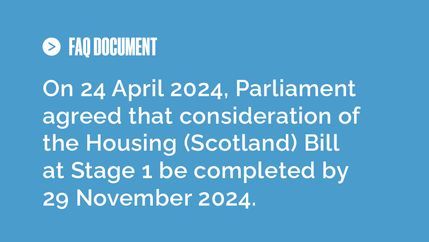
Our message has been clear throughout:
- The best way to make renting affordable is to increase housing supply.
- Rent controls, however well-intentioned, risk reducing the number of homes available and damaging the viability of the private rented sector.
- Exemptions must be fair, transparent, and incentivise investment in improving homes.
If the Bill is passed, attention will turn quickly to secondary legislation, which will set out how rent control areas are designated and how exemptions will operate in practice.
Propertymark will continue to engage directly with the Scottish Government and MSPs to ensure the final framework supports landlords to remain in the market, protects tenants from unintended consequences, and maintains a healthy private rented sector.
Rent controls remain central to the debate
Propertymark has consistently opposed the introduction of rent controls, warning that they deter investment, reduce the number of homes available to rent, and create uncertainty for landlords and agents.
Although we remain concerned about their long-term impact, it is positive that the Scottish Government has listened to our calls for greater clarity and introduced changes at Stage 2. The Bill now states that in any designated rent control area, annual increases will be capped at CPI+1% up to a maximum of 6%.
This formula is less restrictive than earlier proposals but still risks discouraging investment in the private rented sector, particularly at a time when landlords face rising mortgage costs, maintenance bills, and tax pressures.
Exemptions: a critical issue for landlords
Earlier this month, Cabinet Secretary for Housing Màiri McAllan confirmed that consultation responses revealed strong support for certain exemptions from rent controls. The Scottish Government intends to bring forward regulations that will exempt mid-market rent and build-to-rent properties, where appropriate.
Propertymark is clear that exemptions must go further. We continue to press for:
- Recognition of investment – landlords who make significant improvements to their properties should be exempt from rent restrictions.
- Fairness for those charging below market rent – landlords who have kept rents affordable over time must not be penalised.
Without these measures, there is a real risk of creating an uneven playing field between individual landlords and large institutional investors.
Warnings over unintended consequences
We have repeatedly warned that poorly designed rent controls could fuel rent spikes between tenancies as landlords raise rents pre-emptively to guard against future restrictions. This dynamic was evident under the Cost of Living (Tenant Protection) (Scotland) Act 2022, where feedback from our members showed landlords increased rents at changeover in response to the temporary rent freeze.
A wider policy environment already under strain
The Bill comes at a time when landlords face multiple challenges. Mortgage interest, maintenance costs, and licensing fees continue to rise, whilst restrictions on mortgage interest relief and additional property taxes make it harder for small landlords to remain in the sector. Additionally, new obligations to improve property standards are increasing costs, without enough financial support or incentives.
Our research shows that supply is already under pressure, with landlords leaving the market or shifting into short-term lets. Rent controls risk accelerating this trend.
Other measures
Alongside rent controls, the Bill includes reforms designed to strengthen tenant protections and improve housing standards. These include:
- Provisions for greater regulation of letting agents and landlords, aimed at tackling poor practice.
- New requirements around property condition and enforcement, building on existing legislation.
- Proposals for a framework to introduce future reforms in energy efficiency and housing supply.
We support efforts to raise standards and professionalism in the sector, but the Scottish Government must ensure these measures are backed by adequate resources for local authorities to enforce them consistently.
Housing (Scotland) Act
The Housing (Scotland) Bill was introduced on 26 March 2024 and set out plans to make changes to the law covering rent controls, tenants’ rights to keep pets and decorate their homes, and a mechanism to delay evictions under certain circumstances.









